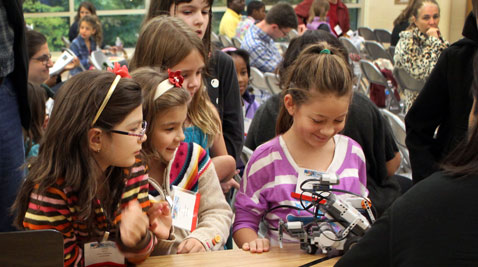SILVER SPRING — What were five dozen pre-teen girls doing in a Silver Spring elementary school on Saturday night? Programming video games, of course.
Girls Get Science, the brainchild of former ForbesWoman columnist Joan Rigdon, is a hands-on educational program that gives elementary school girls in Maryland and the D.C. region positive exposure to science and engineering.

Most kids get to try playing a sport or a musical instrument, Rigdon said, adding: “Why shouldn’t every kid get to program a robot?”
Saturday’s event at Flora M. Singer Elementary School included workshops on robotics, engineering and video game programming, which Rigdon said is always very popular.
Rigdon launched Girls Get Science two years ago after noticing that her co-ed science and technology program, The Great Adventure Lab, was attracting mostly boys, she said. The first Girls Get Science event was capped at 20 participants, but when 40 children and their parents registered, Rigdon knew the program would be a hit.
“It was like selling a life-extending elixir,” she said. “People started calling us…like it was life or death, or something.”
Fifth-grader Maya Hofstetter said Saturday was her first time participating in an event like Girls Get Science. She said her favorite workshop was a “mythbusters” session, where girls tested the laws of physics by attempting to yank a tablecloth off a set table without disturbing the plates and glasses.
Hofstetter’s favorite subject in school is art, but she would try something like Girls Get Science again, she said.
“It was really fun,” she said.
Pamela Conrad, an astrobiologist with NASA who helps explore the possibility of life on Mars, said she thinks many girls experience anxiety or societal pressure when it comes to the science, technology, engineering and mathematical disciplines. Before becoming a scientist, Conrad studied music, performed opera and ran a media production company.

“I did come right out of the box interested in science…but I was really put off by all things technological in junior high because I had a hard time doing the math,” she said. “I had a teacher who told me I was stupid.”
Conrad decided to change career paths in her late 30s and obtained her first job in the science field at age 48. She has been a guest speaker for Girls Get Science and feels strongly about sharing her experience with young people, she said.
“It’s a sacred responsibility of all scientists to make sure that everyone who is not a scientist understands what they do and what their value is to society,” Conrad said.
Saturday was the sixth Girls Get Science event, hosted through Ridgon’s Great Adventure Lab program, and more than 60 girls and their parents participated. Parents are required to attend with their children, and this type of turnout is typical, Rigdon said.
“It’s a great time…the events are basically always sold out,” she said.
During each event, parents hear from a panel of leading female scientists and engineers while their daughters attend workshops. The girls then join their parents to meet and interact with the panelists.
Kate Hagner brought her 8-year-old daughter, Clara, to Saturday’s event and was interested in learning how to encourage young girls in the STEM disciplines, she said. Hagner recently became concerned about her daughter’s aversion to math, she said.
“Clara’s a really inquisitive kid and she really has loved school since the first minute she got into it,” Hagner said. “Just this year, in 3rd grade, she is starting to complain about math and she’s saying things like ‘Math is boring, my friends and I don’t want to do math’ and I’ve just been so surprised at the change.”
Rigdon said she often hears comments from parents about “reluctant girls” and stresses that Girls Get Science is not just for girls already interested in the subject. She hopes to expand the program in the coming years, and has already received requests from schools in other states, including Illinois.


You must be logged in to post a comment.